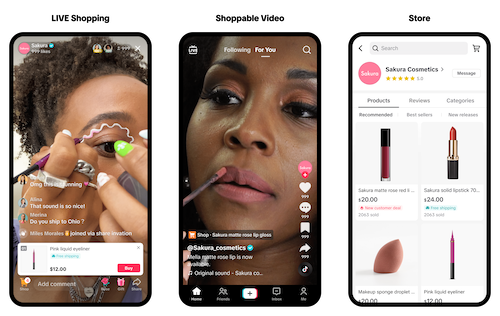The Top Chef Effect: How The Reality Series Transforms Destinations into Culinary Capitals
Mark your calendar. Bravo’s Top Chef returns with its 21st season premieres on March 20, 2024 — and this time around, the “cheftestants” will be...

Following in the footsteps of giants like Amazon, TikTok is on a mission to become the next digital powerhouse in the United States. The short-form video hosting service has already mastered the art of media; it is projected to outpace the growth of advertising businesses at Amazon, Google and Meta by 2025, with a staggering rate of over 22%. But TikTok’s estimated $6 billion in US ad revenue for 2023 is just the beginning of its ambitions to join the ranks of e-commerce heavyweights.
TikTok recently unveiled the TikTok Shop, an all-encompassing in-app commerce solution. This includes such features as shoppable short and live videos, a streamlined checkout process, TikTok Shop ads, efficient order fulfillment, and a dedicated marketplace accessible through a separate Shop tab. However, TikTok isn't trying to replicate Amazon; it's aiming for a path of its own.
Media is the driving force behind TikTok's momentum. TikTok’s For You page, which algorithmically serves users a seemingly endless stream of engaging content, has propelled TikTok into a new level. TikTok isn’t just an app. It’s a genuine entertainment platform.
While TikTok's competitors in the media space, like Meta and YouTube, have attempted to replicate TikTok's technology, they’ve struggled to capture the same cultural essence. If you scroll through Instagram, what will you often see? Recycled TikToks or content inspired by TikTok trends, emphasizing TikTok's unique appeal.
TikTok has several advantages on its side. It caters to a youthful audience whose shopping preferences and brand loyalties are still in the formative stages. Even more, with the financial backing of its parent company, ByteDance, TikTok can afford the expected $500 million loss that TikTok Shop may incur this year.

The real catalyst for TikTok's success lies in its creators — the same driving force that fueled its initial growth. Through its Shop affiliate program, creators can earn commissions from sales; the program has already attracted over 100,000 creator sign-ups since launching earlier this year. Amazon has tried to get onboard with creators, too, but its recent offer to pay creators $25 per video to boost its "Inspire" feed was met with skepticism. This isn't due to a lack of technological prowess but rather because Amazon's core identity revolves around convenience, not inspiration.
In contrast, TikTok's e-commerce business thrives on trends and the fear of missing out (FOMO) delivered to users by creators. TikTok is where people come to find inspiration, discover new products and purchase items they desire rather than solely what they need. TikTok's sponsored content tools and innovative ad formats are designed to facilitate this behavior.
TikTok’s e-commerce moves have significant economic implications. TikTok aims to compete with the already established Shein and Temu — Chinese brands that allow US consumers to order directly from sources in China, removing the need for retail store fronts or distribution channels.
As the US economy continues to find its footing, cash-strapped consumers will continue to seek alternative sources for products they need. Eliminating the middleman means these products can come at lower price points, even if shipping is slower.
TikTok is changing e-commerce — plain and simple. Brands will need to embrace these social channels, influencers and product sponsored videos, without hesitation. Brands have to find what channels their customers are on, and offer them products based upon videos and content they engage with in a genuine and authentic way.
TikTok's e-commerce offerings deliver a distinctive shopping experience, even if the marketplace may resemble an Amazon counterpart. With its emphasis on trends, inspiration and the power of its creator-led community, TikTok will quickly carve out its own unique space in the e-commerce landscape.

Mark your calendar. Bravo’s Top Chef returns with its 21st season premieres on March 20, 2024 — and this time around, the “cheftestants” will be...

Whether you’re from Manhattan’s Upper East Side or the rural areas of Marfa, Texas, everyone in the United States can get on board with Fourth of...

Food is a major factor when it comes to travel. Recent research reveals that for 81% of travelers the most exciting part of a vacation is trying...